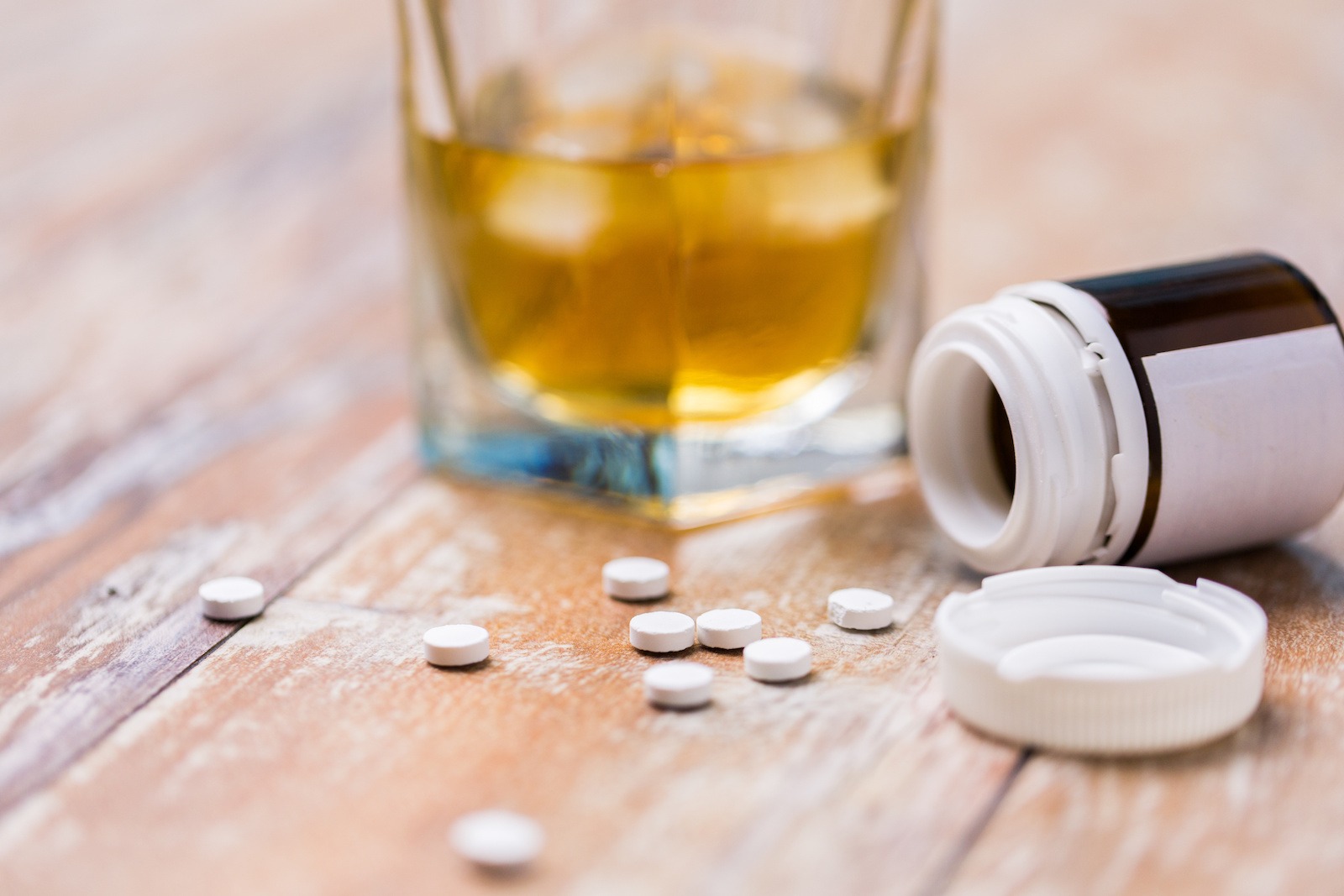Addiction | 4 min read
Hydrocodone and Alcohol: Side Effects, Risks, and Precautions
Medically Reviewed By

On August 28, 2024
Written By
On December 10, 2021

What you will learn
- Hydrocodone is an opioid medication that’s prescribed for pain, but it’s also abused for its effects.
- Like other opioids, hydrocodone is a depressant that slows brain activity and shouldn’t be mixed with other depressants like alcohol.
- Combining alcohol and opioids can slow breathing to dangerous levels, possibly leading to death.
- Addiction to opioids or alcohol can increase the risk of a fatal overdose.
Alcohol use is legal and common in the US. Many people can have drinks on occasion without ill effects. However, if you’re on prescription medications and combine them with alcohol, it can lead to unpredictable and adverse effects – especially with opioids like hydrocodone.
Learn more about the risks of mixing hydrocodone and alcohol, overdose risks, and treatment options for substance use disorders.
What Is Hydrocodone?
Hydrocodone is an opioid drug that’s found in prescription pain relievers like Vicodin. Medications with hydrocodone are among the most commonly prescribed in the US. Doctors may prescribe drugs containing hydrocodone for moderate-to-severe pain that hasn’t responded to other treatments. Hydrocodone is also used in combination with other medications for cough suppression in some cases.
Along with therapeutic effects, hydrocodone can cause side effects like euphoria, drowsiness, and confusion. Used in high doses or with other substances, hydrocodone can carry serious risks of dependence, withdrawal, and addiction.
Opioids like hydrocodone have a significant risk of overdose because of their depressant-like effects on the brain.[1] When this occurs, breathing can slow to near-fatal or fatal levels. This is a risk on its own with hydrocodone, especially in high doses, but the risk is significantly higher if you mix hydrocodone with alcohol, which depresses the body further.
Dangers of Mixing Hydrocodone and Alcohol
Mixing hydrocodone and alcohol is extremely dangerous. Both of these drugs are central nervous system depressants, increasing the risk of overdose and life-threatening complications.
Both alcohol and hydrocodone have similar effects. They cause feelings of euphoria and relaxation because they slow down central nervous system activity. Together, they can result in slowed or arrested breathing, reduced heart rate and blood pressure, unconsciousness, coma, and possible death.[2]
Alcohol and Hydrocodone Overdose
An overdose is a significant risk of mixing alcohol and opioids like hydrocodone. The signs of a possible overdose involving alcohol or hydrocodone include:[3,4]
- Severely altered mental status
- Loss of consciousness
- Weak pulse
- Slow or shallow breathing
- Difficulty breathing
- Blue or purple lips and nails
- Unresponsiveness
What to Do If Someone Is Overdosing
If you suspect someone has overdosed on opioids, alcohol, or a combination of the two, call 911 immediately. Tell the responders what substances you believe are involved. While you wait, try to keep the person awake and breathing, and lay them on their side to prevent choking if they vomit.
If possible, stay with the person until help arrives. If you have naloxone, administer it. This can reverse or partially reverse an opioid overdose until help arrives.
Understanding Polysubstance Use
Polysubstance use, or polydrug use, involves the consumption of more than one drug at the same time. An addiction to more than one drug is known as a polysubstance use disorder.[5] Though polysubstance use often refers to the abuse of multiple illicit drugs, it can include misuse of legal drugs like alcohol or prescription medications.
With polysubstance use, someone on a prescription medication may unintentionally combine substances, such as having a glass of wine at dinner, without realizing it can be dangerous on an opioid painkiller like hydrocodone. This can also occur with multiple prescriptions from different doctors if you don’t tell each of them what medications you’re on.
However, some people may engage in polysubstance abuse or misuse deliberately to amplify the effects of each substance. Others may regularly misuse substances and take them with similar substances – such as depressants like alcohol and opioids – to experience enhanced sedative effects.
Polysubstance abuse can enhance the effects of different drugs, but it also significantly increases the risks. There are not only compounded effects, but mixing drugs can lead to unpredictable negative health consequences like respiratory depression or liver damage.
Detox for Polysubstance Abuse
Both alcohol and opioids or opiates can lead to dependence quickly, which is when the body becomes accustomed to the presence of a drug and needs it to function. If you are dependent on alcohol and opioids, you may experience withdrawal from stopping either one or both.
Alcohol withdrawal can be intense and potentially dangerous. There are uncomfortable symptoms, such as headaches, nausea, tremors, anxiety, and hallucinations, as well as possible seizures that can be life-threatening.[6]
While not as dangerous, opioid withdrawal can have severe and painful symptoms like body aches, flu-like symptoms, nausea and vomiting, diarrhea, and psychological symptoms.[7] In rare cases, fluid loss from vomiting and diarrhea can lead to dangerous levels of dehydration and possible organ failure.
Withdrawal from both alcohol and hydrocodone can be more complicated and riskier than withdrawal from just one substance. You should never try to quit alcohol or opioids on your own. Medical detox is recommended to have medical supervision and care to reduce the severity of withdrawal symptoms and prevent potentially fatal complications.
In some cases, medications may be used to counteract withdrawal symptoms, such as anti-nausea medication for vomiting or sleep aids for insomnia. With alcohol, benzodiazepines like Ativan may be used to help with withdrawal symptoms.[8]
There are medications used for opioid withdrawal as well, such as methadone or buprenorphine.[9] These drugs don’t replace the addiction to one opioid with another but help to wean you off of opioids with less severe withdrawal symptoms and cravings.
These drugs need to be used very carefully, especially with polysubstance withdrawal. Polysubstance withdrawal can be extremely unpredictable, so medical monitoring is always necessary to decrease the likelihood of complications or relapse.
Treatment for Polysubstance Addiction
Detox is a crucial step toward polysubstance addiction recovery, but it’s not enough on its own. After detox, it’s important to start a comprehensive addiction treatment program that includes individualized care to address the social, emotional, and psychological aspects of addiction. While your treatment may vary, it may include individual and group counseling, behavioral therapies, and support groups.
Get Help for Polysubstance Abuse
Opioid painkillers like hydrocodone have plenty of risks on their own, but the risks are compounded when you mix opioids with alcohol. If you’re struggling with an addiction to opioids, alcohol, or both, help is available. Getting addiction treatment significantly reduces the risks of overdose and adverse health effects.
Frequently Asked Questions About Hydrocodone and Alcohol
Prescription opioids like hydrocodone should never be mixed with alcohol. Combining these two substances can result in slowed or arrested breathing, weak pulse and blood pressure, unconsciousness, coma, and possible death.
Hydrocodone can have possible drug interactions, including potentially dangerous interactions with other depressants like alcohol, benzodiazepines, or sedatives. You should also avoid mixing hydrocodone with illicit drugs like heroin, cocaine, or methamphetamine.
Narcotic painkillers, or opioid painkillers, shouldn’t be taken with alcohol. Both opioids and alcohol are depressants and may slow your breathing to dangerous levels.
Hydrocodone can make you drowsy. Do not drive a car or operate machinery until you know how this medication affects you. Hydrocodone can also cause lightheadedness, dizziness, and fainting.
Ascendant New York Editorial Guidelines
Here at Ascendant New York, we understand the importance of having access to accurate medical information you can trust, especially when you or a loved one is suffering from addiction. Find out more on our policy.
[1]Cofano, S. (2024, February 29). Hydrocodone. StatPearls [Internet]. https://www.ncbi.nlm.nih.gov/books/NBK537288/
[2] Singh, A. K. (2019, March 7). Alcohol interaction with cocaine, methamphetamine, opioids, nicotine, cannabis, and γ-hydroxybutyric acid. MDPI. Retrieved from https://www.mdpi.com/2227-9059/7/1/16 on 2024, July 26.
[3] WebMD. (n.d.). Alcohol poisoning: Symptoms, causes, complications, and treatment. WebMD. Retrieved from https://www.webmd.com/mental-health/addiction/alcohol-poisoning-overview on 2024, July 26.
[4] U.S. National Library of Medicine. (n.d.-c). Opioid overdose. MedlinePlus. Retrieved from https://medlineplus.gov/opioidoverdose.html on 2024, July 26.
[5] Polysubstance use disorder – what you need to know. Drugs.com. (n.d.-d). Retrieved from https://www.drugs.com/cg/polysubstance-use-disorder.html on 2024, July 26.
[6] WebMD. (n.d.-b). Alcohol withdrawal: Symptoms, treatment and alcohol detox duration. WebMD. Retrieved from https://www.webmd.com/mental-health/addiction/alcohol-withdrawal-symptoms-treatments on 2024, July 26.
[7] Shah, M. (2023, July 21). Opioid withdrawal. StatPearls [Internet]. Retrieved from https://www.ncbi.nlm.nih.gov/books/NBK526012/ on 2024, July 26.
[8] Sachdeva, A., Choudhary, M., & Chandra, M. (2015, September). Alcohol withdrawal syndrome: Benzodiazepines and beyond. Journal of clinical and diagnostic research : JCDR. Retrieved from https://www.ncbi.nlm.nih.gov/pmc/articles/PMC4606320/ on 2024, July 26.
[9] Shah, M. (2023a, July 21). Opioid withdrawal. StatPearls [Internet]. Retrieved from https://www.ncbi.nlm.nih.gov/books/NBK526012/ on 2024, July 26.





